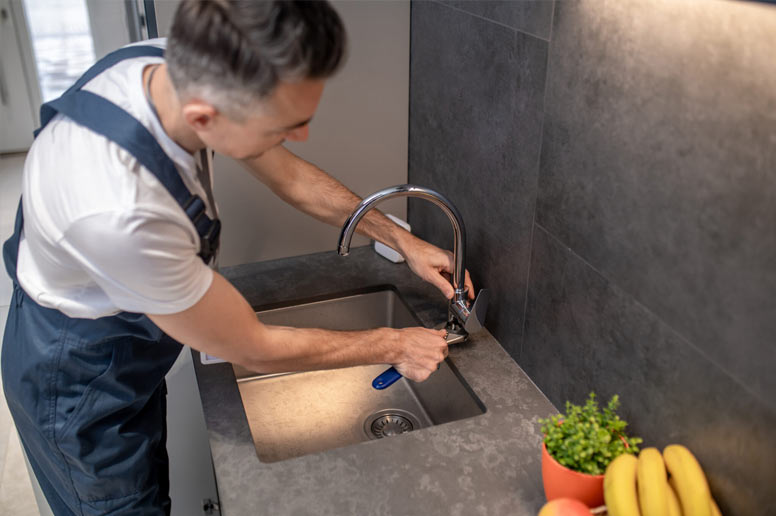How To Get a Plumbing License in 2024: 6 Simple Steps

This guide will walk you through how to get your plumbing license in the United States, in 2025.
If you’re thinking about a plumbing career, you’re in for a rewarding, hands-on profession that offers solid earning potential and job security.
But here’s the deal: to unlock the best opportunities in the industry, you need a plumbing license. It’s not just a legal checkbox—it’s your ticket to better pay, bigger projects, and serious credibility.
Whether you’re just starting out or aiming to level up your qualifications, you’ll find everything you need to know to get licensed and excel in the trade.
Let’s get into it!
Table of Contents
Why Getting Licensed Matters
Let’s be honest—plumbing isn’t something people leave to chance.
Clients want someone they can trust, and a plumbing license tells them you’re the real deal. Is it worth the effort?
Yes, and here’s why:
- Stay Legal: Most states require a license to work as a plumber. Without one, you could face hefty fines or even lose the right to work.
- Earn More: Licensed plumbers—especially those licensed as master plumbers—can pull in between $75,000 and $100,000 a year, depending on experience and location.
- Secure Better Jobs: From government contracts to large commercial projects, the best gigs go to licensed professionals.
- Build Trust: A license shows clients and employers you’ve mastered the trade and follow strict safety standards.

The Three Levels of Plumbing Licenses
Plumbing isn’t a one-size-fits-all profession. Your license reflects your experience and the type of work you can take on:
- Apprentice Plumber License:
Here is where it all begins. As an apprentice, you’ll learn the ropes under a licensed plumber while completing classroom training. It’s the perfect mix of theory and hands-on experience. - Journeyman Plumber License:
After completing your plumbing apprenticeship and passing your plumbing exam, you can work independently. With a journeyman license, you’re free to tackle projects on your own. - Master Plumber License:
Ready to lead? A master license qualifies you to manage teams, take on complex jobs, and even run your own plumbing business. It’s the top tier of the trade.
6 Steps to Getting Your Plumbing License
Licensing rules vary by state, but most plumbers follow these six steps to get licensed:
1. Meet the Education Basics
Most states require a high school diploma or GED as a starting point. Many plumbers also attend trade schools to get ahead. These programs cover essentials like math, blueprint reading, and plumbing fundamentals—skills you’ll use daily.
2. Find an Apprenticeship Program
Think of apprenticeships as on-the-job training with a paycheck. These programs, usually 2–5 years long, combine classroom lessons with practical experience.
Pro Tip: Check out local unions, trade associations, or contractors in your area to find a program that suits your goals.
3. Log Those Work Hours
Most states require between 4,000 and 8,000 hours of supervised work before you can apply for a license.
Keeping track of these hours can feel like a job in itself, but tools like Invoice Fly make it easy to document your work and stay organized.
4. Pass Your Licensing Exam
Licensing exams test your knowledge of plumbing codes, safety standards, and system design. Some states also require hands-on assessments to prove your skills in real-world scenarios.
Pro Tip: Study smarter: Use state-specific guides and practice tests to prepare.
5. Submit Your Application
Gather your documents—proof of education, work hours, and exam results—and submit them to your state’s licensing board. Fees range from $50 to $500, depending on where you live.
6. Keep Your License Current
Most licenses are renewed every 1–2 years, and some states require continuing education. Staying up-to-date ensures you remain compliant, knowledgeable and an expert in your trade.
RELATED ARTICLE: How To Price Plumbing Jobs in 2025? The Definitive Guide

State-Specific Licensing Requirements
As we mentioned earlier, licensing isn’t one-size-fits-all and differs state to state. Take a look at the applicable fees and what to expect in a few key states, besides being +18 years old:
California
- License: C-36 Plumbing Contractor
- Requirements: 4 years of journeyman experience and passing trade/business law exams.
- Fees: $450 application, $200 for the initial license.
- Renewal: Every 2 years, with continuing education.
- Authority: California Contractors State License Board
Florida
- License Types: Certified (statewide) and Registered (local).
- Requirements: 4 years of experience or apprenticeship completion, plus exams.
- Fees: Around $295.
- Renewal: Every 2 years, with continuing education.
- Authority: Florida Department of Business and Professional Regulation
Texas
- License Levels: Tradesman (4,000 hours), Journeyman (8,000 hours), Master (additional experience).
- Fees: $50–$75.
- Renewal: Annually, with continuing education.
- Authority: Texas State Board of Plumbing Examiners
New York
- Management: Licensing is handled locally (e.g., NYC Department of Buildings).
- Requirements (NYC): 7 years of work experience and passing exams.
- Fees: Around $200.
- Renewal: Varies by locality.
- Authority: New York City Department of Buildings
Set Your Plumbing Business Up for Success
You can simplify your licensing journey with a few straightforward steps:
- Keep Records: Use tools like Invoice Fly to track your plumbing work hours, expenses, and application deadlines.
- Stay Informed: Licensing rules and plumbing codes can change—check your state’s guidelines regularly.
- Specialize: Consider focusing on niches like eco-friendly plumbing or commercial systems to stand out in the market.

Final Thoughts
Earning your plumbing license is a game-changer.
It’s your ticket to working on bigger projects, building trust with clients, and growing your business with confidence. This is your chance to take that next step and create the career you’ve been working toward.
Ready to streamline your operations and focus on growth?
Download Invoice Fly today to manage your invoices, track expenses, and simplify your business processes.

Plumbing License FAQs:
Yes, a license is typically required to operate legally in most states in the U.S.
Some states have reciprocity agreements, but you may need to meet additional requirements or take an exam.
On average, it takes 2–5 years, depending on your apprenticeship and state requirements.
You could face fines, lawsuits, and potential damage to your reputation—not to mention losing the chance to get licensed in the future.
Ellie McKenna is a creative copywriter born in United Kingdom.
Although was born in Northern Ireland, she possesses extensive knowledge about SaaS and Mobile Apps products in the United States, as she has been in-house writer, agency writer and freelance for American companies.
Working at Vista has allowed her to create content that focus on the user search intent, creating great informative articles for contractors and small businesses in the U.S.



